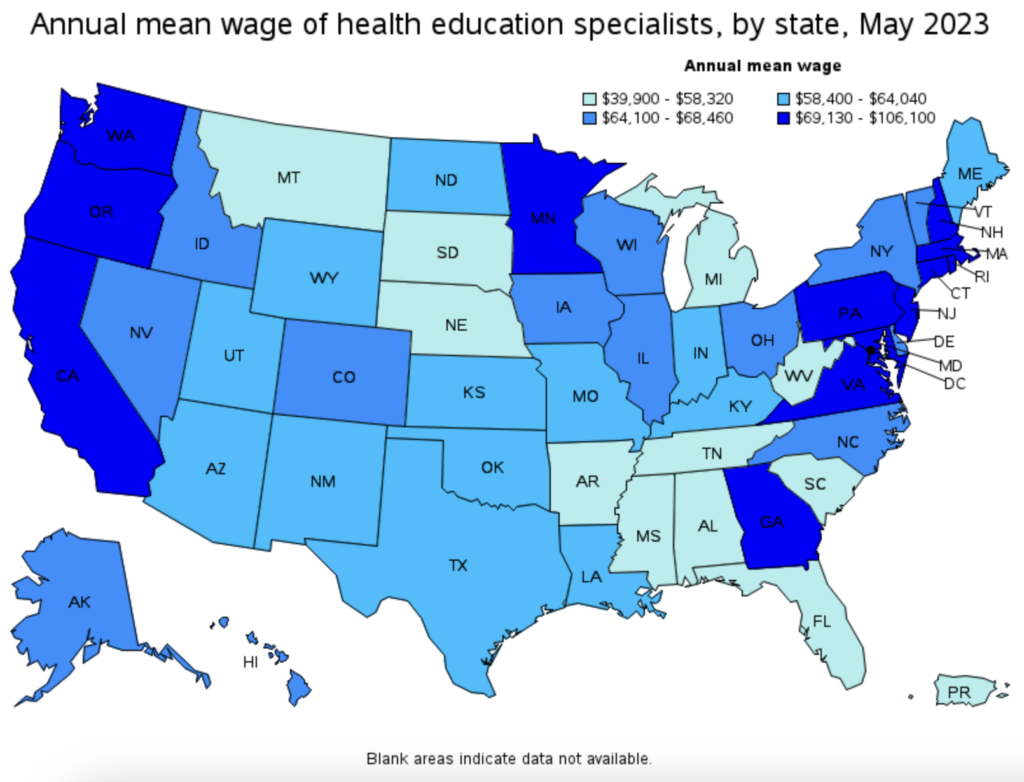Health and wellness management offers a range of career opportunities, including workplace wellness manager, health educator, community health coordinator, benefits specialist, and more.
Positions vary depending on industry, work environment, and employer. Typically, wellness management jobs can be found in hospitals, organizations providing healthcare and/or wellness services, government agencies, and private businesses that offer workplace wellness programs to their employees.
Workplace Wellness
 While early workplace wellness programs were born out of a desire to control rapidly rising healthcare costs through preventive healthcare measures, the motivation for employers has evolved to include a wider range of concerns related to employee well-being. The COVID-19 pandemic, along with a tight labor market, has elevated the importance of the wellness professional and an employer’s responsibility to their employees. Workplace well-being has expanded to address current issues, such as the transition from in-person to fully remote and hybrid work models, a greater need to offer competitive benefits to attract and retain top talent, and changing expectations—both within the new workplace and beyond—toward achieving a more optimal work-life integration.
While early workplace wellness programs were born out of a desire to control rapidly rising healthcare costs through preventive healthcare measures, the motivation for employers has evolved to include a wider range of concerns related to employee well-being. The COVID-19 pandemic, along with a tight labor market, has elevated the importance of the wellness professional and an employer’s responsibility to their employees. Workplace well-being has expanded to address current issues, such as the transition from in-person to fully remote and hybrid work models, a greater need to offer competitive benefits to attract and retain top talent, and changing expectations—both within the new workplace and beyond—toward achieving a more optimal work-life integration.
RELATED: What is Health and Wellness Management?
Wellness Management Skills for an Evolving Field
The wellness professional has experienced changing roles and responsibilities since the emergence of workplace wellness programs. Most importantly, employers have embraced an expanded array of health concerns to address through their well-being initiatives.
To be effective in today’s workplace, the wellness professional needs knowledge, skills, and abilities in the following areas:
- An understanding of US healthcare systems, including public health, insurance, and healthcare providers
- Communication strategies that connect with employees and senior leadership
- Ability to implement a legally compliant wellness strategy
- Inclusive and accessible approach to wellness program design that reaches a diverse workforce
- Self-awareness and understanding of the limits of their own knowledge, and the ability to refer individuals to other professionals when needed
- Facility with digital wellness technology to engage with a remote and hybrid workforce
RELATED: UW Instructor Encourages Health and Wellness Students to Be Agents of Positive Change
“One of our core values here at Children’s Wisconsin is collaboration. In my role, there are other team members that I tap to help me with my work. From a collaboration perspective, being able to understand how diversity in perspectives and backgrounds help you create a wellness program that is inclusive to all is an important skill to have and sharpen.” —Eric Ziarek, Wellness Program Manager at Children’s Wisconsin, and UW Health and Wellness Management Advisory Board member
Community Health
 Community health workers focus on the health of the community, by organizing programs that promote wellness such as health screenings or improve access to medical services, among other activities. They may work closely with healthcare providers, insurance agencies, or social service agencies.
Community health workers focus on the health of the community, by organizing programs that promote wellness such as health screenings or improve access to medical services, among other activities. They may work closely with healthcare providers, insurance agencies, or social service agencies.
Examples of reported job titles from O-Net Online include: Apprise Counselor, Community Health Outreach Worker, Community Health Program Coordinator, Community Health Program Representative (Community Health Program Rep), Community Health Promoter, Community Health Worker (CHW), Community Nutrition Educator, and HIV CTS Specialist (Human Immunodeficiency Virus Counseling and Testing Services Specialist).
While entry-level jobs in community health may only require a high school diploma or associate degree, many employers are looking for candidates who have post-secondary education, such as a bachelor’s or master’s degree. Developing skills and knowledge across the range of activities a community health worker might encounter in their daily work, such as wellness, communication, and health advocacy, can lead to advanced roles.
A Rewarding Career with a Bright Outlook
According to the US Bureau of Labor Statistics (BLS), employment of health education specialists is projected to grow 7 percent from 2023 to 2033 (faster than the average for all occupations), while employment of community health workers is projected to grow 13 percent during that same period (much faster than the average for all occupations).
“Bright Outlook occupations are expected to grow rapidly in the next several years [and] will have large numbers of job openings. Demand for health education specialists and community health workers are expected to grow rapidly.” —O-Net Online classifies occupations as Bright Outlook based on growth forecasted by the BLS.
Additionally, forty-five percent of respondents surveyed for Wellable’s 2024 Employee Wellness Industry Trends Report expect to invest more in health and well-being programs in 2024. As organizations increasingly choose to support employees across all dimensions of health, including physical, mental, and emotional health, demand for professionals that know how to approach wellness holistically and have the skills to lead flexible, personalized programs will grow.
Drivers behind the growing demand for community health workers include an aging population, an increase in chronic disease, mental health issues, and public health initiatives.
Wellness Management Jobs and Salaries

According to the 2023 U.S. Wellness Professional Compensation Report, published by Wellable and the National Wellness Institute, median average compensation for all wellness professionals ranges from less than $50,000 to more than $200,000.
Factors that can impact salaries include location, education, years of work experience, job title, number of direct reports, if any, and performance. Those working along the East and West coasts receive higher average salaries than their colleagues in the central US. Wellness professionals with a decade or more of experience reported median average salaries between $50,000 to $99,000.
According to the BLS, the median annual wage for health education specialists was $62,860 (May 2023). For community health workers, the BLS reports a median annual wage of $48,200 (May 2023).
Job titles and salary ranges in this field vary. Some examples (based in the United States):
- Wellness program administrator ($46,873-$112,333)
- Wellness coordinator ($49,964-$85,238)
- Wellness program manager ($78,153-$137,244)
- Wellness coach ($58,906-$90,664)
- Community health specialist ($45,280-$71,168)
- Senior health educator ($58,573-$100,880)
- Community health advocate ($100,945-$217,291)
Source: Salary.com’s 2024 salary calculator
Get Program Guide
Learn more about our 100% online degree and certificate programs.
Earning a Certificate or Degree can Build Expertise
Build on your experience, deepen your expertise, and grow the wellness skills that employers need with a graduate certificate in wellness management, leadership, or health data and policy, or a master’s degree in Health and Wellness Management.
“[With] a lot of other programs, you’re either doing health and wellness or how to earn a paycheck, not usually both. I really love the fact that this program marries those two things.” —Garrett Stangel, UW Health and Wellness Management student and owner of Balance Fitness
The program offers flexibility to build your skills and career on your own schedule, over time. Courses are completed entirely online, and teach you how to apply a holistic approach to wellness program planning, whether you are leading health promotion initiatives in a workplace, community health agency, or other organization.
RELATED: Health and Wellness Management Careers: UW Graduates in the Workplace
Your Next Career Move—Health and Wellness Management
As a graduate of the online UW Health and Wellness Management master’s degree or certificate in wellness management, leadership, or health data and policy, you’ll be qualified to lead wellness programs in a variety of settings across the country. Enrollment advisers can help with all of your program questions. Call 608-262-2011 or email learn@uwex.wisconsin.edu.









